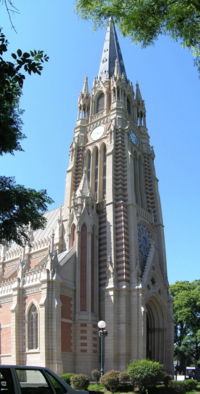
Argentina is the third most populous nation in South America with approximately 41 million inhabitants. Over ninety percent of the population professes a belief in God. This culture of religious belief stems from the Italian and Spanish Catholic immigrants who settled Argentina. This led to an intertwining of the Catholic Church with the government at a very early stage in the country’s history.
However, the seeds of religious liberty were sown as a result of immigration in the 1800s when protestant foreigners came to the country to work in various industries. The Argentine Constitution explicitly encouraged immigration, particularly European immigration, in order to bolster its industry. The founders recognized the necessity of religious liberty if they were to attract immigrants to populate the country and spur the desired growth. As a result, the Constitution guaranteed these foreigners the right “to practice their religion.” This same idea is found in preamble which seeks to “… secure the blessings of liberty to ourselves, to our posterity, and to all men of the world who wish to dwell on Argentine soil…”
Article 2 of the Argentine Constitution provides specific support for the Roman Apostolic Church. The effect of the provision is an all but explicit establishment of Catholicism as a State religion. Government “support” of Catholicism has varied in nature over the course of Argentina’s history, ranging from government manipulation of the Catholic Church to periods of greater autonomy. The Catholic Church still receives a significant amount of financial support from the government. This degree of financial support is not given to other churches.
Provincial constitutional provisions range from a simple guarantee of freedom of religion and conscience to the explicit establishment of Catholicism as a State religion. The strong relationship between the Argentine government and the Catholic Church continues to attract attention in the debate regarding religious liberty, even as the country enjoys a relatively great degree of religious freedom.
The Federal Constitution as well as most of the provincial constitutions establishes freedom of religion or conscience. Although the provision in Article 14 of the Argentine Constitution lacks detail as to the nature of those religious rights, certain specific rights have been contemplated in proposed legislation and scholarly articles. These include the right to profess, change or abandon beliefs; to manifest them openly or abstain from doing so; to collectively practice a religion openly or in secret; to not be obligated to practice religion contrary to one’s conscience; to receive assistance in hospitals, asylums, jails, or quarters from the ministers of one’s choosing, receive an honorable burial according to one’s own convictions; associate oneself with religious communities and activities and meet publicly for religious purposes.
Many of these rights, while not explicitly mentioned in the text of the constitution are recognized under nine international treaties on human rights which the constitution incorporates as law in section 75 §22. The constitution specifies that these treaties are to be given more deference than normal laws passed by the legislature. There has been some debate regarding the effectiveness of such a wholesale adoption. While both the Supreme Court as well as lower courts have cited the treaties in court decisions, some scholars argue that such an adoption was less effective in part because it precluded involvement from local human rights organizations that could have contributed to create a statute attuned the needs of the Argentine people.
There are also laws which limit or restrict religion in Argentina. One important limitation is the restriction on the legal status of churches and religious organizations. Some of these laws were passed during the military dictatorship of the 1970s and 1980s. During this period, the government exercised significant control over the Catholic Church by means of the existing special state relationship. The government controlled non-Catholic churches by passing laws requiring registration of all religious organizations. The first such law was Ley No. 21.745 which created the National Registry of Religions and required religious organizations to register in order to continue in operation. Failure to comply with the Ley No. 21.745 resulted in prohibition which occurred to several religious organizations including Jehovah’s Witnesses and the Hare Krishna. Religious organizations have been trying for over a decade to introduce legislation that would repeal Ley No. 21.745 in favor of a different law that would give other religions official status equal to that of the Catholic Church. In addition, these churches maintain that the disclosure requirements of Ley No. 21.745 are unconstitutional because they infringe on the right to religious liberty specified in Article 14 of the Constitution.
(Source: “Argentina: Law and Religion Framework”; notes omitted)